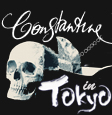I have included a critical review of The Ring to accompany my YouTube review…
The 1998 the release of Nakata Hideo’s RING (or RINGU) revolutionized not only the Japanese horror genre but in many way revitalized the Japanese film industry, which had toiled away in obscurity since the 1980s. The film was based off a novel of the same title written by author Suzuki Koji. The plotline of RING is probably known by pretty much anyone who watches film – there exists a haunted videotape that will kill you seven days after you watch it. Asakawa – a young reporter and single mother – finds herself cursed by the tape and must try and solve the mystery of its origins before her time runs out. Along the way she teams up with her ex-husband, who seems to possess some psychic ability himself, and accidentally exposes her young son to the curse as well. That is the plot line of the movie. The novel’s plot is actually quite different. Asakawa is actually a man who is fighting to protect his wife and daughter from the curse. Suzuki Koji, the author, states that this was a conscious choice made to highlight what he calls the ‘gendering’ of Japanese society. He feels that within modern Japanese society, the responsibility of raising the children is placed solely on the shoulders of women and that fathers play a very distant and uninvolved role.
This is the first installment of a new series I am doing on YouTube where I review Japanese films. This episode is about Takashi Miike’s AUDITION. I have written a review AND translated the final chapter of the novel that Miike’s film was based on. You can find them both here.
Japanese Film Reviews #1: Miike Takashi’s AUDITION
Murakami Ryū’s Audition is best known for the 1999 film adaptation by director Miike Takashi. Written in 1997, the novel was first serialized, ironically, in Penthouse Japan (Murakami, 226). Despite the film’s status as a cult classic, the novel has yet to be translated into English and distributed in the United States. This is very unfortunate because Murakami’s Audition is one of his most focused novels and Miike’s film is one of the best film adaptations I have ever seen. While Murakami Ryū is well-known for his shocking and often grotesquely descriptive stories about sex, violence, and drug use in modern Japan, Audition is remarkably subtle and a large part of the novel is devoted to developing the relationship between Aoyama Shigeharu, a likeable though somewhat old-fashioned widower, and the beautiful, enigmatic Yamazaki Asami. Seven years after the death of his wife, Aoyama’s son, Shigehiko, suggests that he get remarried. Unsure of how to find the right partner and unwilling to sift through all the available young women (whom are presented as spoiled, uncultured and annoying), Aoyama’s friend decides to arrange a mock audition where he can meet beautiful young women and find the ideal partner. Aoyama quickly becomes infatuated with Yamazaki Asami and decides that she will be his future wife. However, it gradually becomes clear that Yamazaki, who has always seemed rather detached and strange, has a violent and traumatic past. Aoyama chooses to disregard this until Yamazaki’s disappearance forces him to investigate it further. After her disappearance, the novel becomes increasingly dark and twisted, culminating in the shocking climax for which the story is famous.

Recent Comments